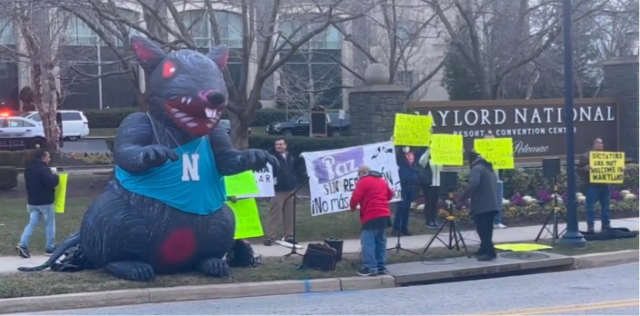Bukele Targets “Gender Ideology” Boogeyman Following Speech at CPAC
On February 22, Nayib Bukele spoke at the far-right Conservative Political Action Conference (CPAC) outside of Washington, D.C. Days later, his Education Minister announced, via X, the removal of “any trace of gender ideology from schools.” The move mirrored the moves of recently-elected Argentinian President Javier Millei, who followed up his own appearance at CPAC with similar policies that ban the use of gender-inclusive language in government communications - and further affirmed that the right-wing, misogynistic, and anti-LGBTI+ posture of Bukele’s government will continue in full force in his second (unconstitutional) term as president.
Other speakers at CPAC this year included Donald Trump, representatives from far-right parties in Spain and Hungary, and Brexit leader Nigel Farage. Pizzagate conspiracy theorist Jack Posobiec, whose CPAC speech included a proclamation that attendees will overthrow democracy and replace it with Christianity, lamented, “We didn’t get all the way there on January 6th,” a comment reminiscent of a remark made weeks earlier by Salvadoran Vice President Felix Ulloa. Speaking to the New York Times in the lead-up to the presidential elections, in which his candidacy was prohibited by the Salvadoran Constitution, Ulloa said, “To these people who say democracy is being dismantled, my answer is yes — we are not dismantling it, we are eliminating it. We are replacing it with something new.”
The gathering, organized by the American Conservative Union, welcomes alt-right speakers, and champions Trump’s “MAGA” anti-immigrant, anti-LGBTI+ culture and is ostensibly rooted in conservative Christian beliefs and American Exceptionalism. Bukele’s brand and policies are in lockstep with CPAC, its organizers, and attendees. The populist energy that Bukele rode to the presidency, for example, heavily relied on presenting himself as an “outsider,” not “Los mismos de siempre” (“the Same Old Crowd” in English) - a narrative matching Trump’s “Drain the Swamp” rallying cry. In his nearly-five years as president, his government has shut down and/or reduced the size of many government institutions, laying off over 21,000 government workers in flagrant violation of Salvadoran labor law. He has attacked unions and feminist organizations that protest these violations, jailed environmentalists, and instituted a now-indefinite State of Exception, eliminating civil liberties and militarizing communities under the guise of a war on gangs.
Despite claiming that "in El Salvador, we do not use the judicial system to persecute our political opponents,” (in reference to the many judicial proceedings against Donald Trump) political persecution is widely documented in the country. The Committee of Families of Political Prisoners of El Salvador (COFAPPES) has identified over 150 political prisoners ranging from former FMLN officials to union leaders and environmentalists. Bukele also made a self-congratulatory point of his presidential victory weeks earlier in what he described as “free and fair” elections. While his presidential victory is not in question, his candidacy for a consecutive second term violates the country’s constitution. The elections have been widely denounced for having taken place under a two-year long State of Exception during which his party routinely thwarted electoral laws.
Following his CPAC speech, Bukele spoke with Moms for Liberty National Director Carolina Stubbe. Moms for Liberty is a far-right extremist organization that aims to eliminate education about gender and sexual diversity, as well as racially-inclusive curriculums, in schools. Bukele, in response to Stubbe’s question about what he is doing to keep “Marxist gender ideology” out of schools, responded by saying that “those ideologies” are not allowed into Salvadoran schools because they are “anti-nature, anti-family, and anti-God.” He went on to say that it is a “plan to destroy future generations” and that it is important that God be included in school curriculums.
Days after the remarks, on February 27, Education Minister José Mauricio Pineda published a tweet confirming that all references to “gender ideology” had been removed from schools. The Education Ministry had made a similar move in October 2022, banning materials related to sexual health and gender-based violence. The same day, the Health Ministry removed a page from their site that included information about HIV and its testing and treatment programs. They also removed educational materials from health clinics as well as fields pertaining to sexual orientation, gender identity, and non-cisgender sexual partners from the HIV test intake form.
Bukele’s and his Education Minister’s terminology and recent policies closely mirror the policies and rhetoric promoted by Project 2025, a far-right coalition which has created a 887-page manual called “Mandate for Leadership: The Conservative Promise” for implementing its ultra-conservative agenda if Donald Trump wins the November presidential election. The manual is an explicit attack on the LGBTI+ community and the fight for gender equality, stating in one section that “The next Administration should take particular note of how radical gender ideology is having a devastating effect on school-aged children today—especially young girls.” It offers a range of policies across governmental agencies that will restrict protections and services for LGBTI+ people and calls for an end to “comprehensive sexual education.”
Bukele’s Far-Right Alignment Is Not New
In 2014, while serving as mayor of the small suburb of Nuevo Cuscatlan with the leftist FMLN party, Bukele proclaimed himself an ally of the LGBTI+ movement. With his eyes already set on the 2015 election in which he would be elected mayor of San Salvador, he met with a group of LGBTI+ activists. In the meeting, he stated, “I think the civil rights struggle of our time is that of the LGBT community, and I want to be on the right side of history. I've always said that, and my fear is to be on the other side [...], I'm not going to be on the side of the discriminators, if that makes me a hetero ally, then that’s what I am.”
These comments reflect the kind of politician Nayib Bukele portrayed himself as in the early part of his political career and are part of the image he sold on his way to the presidency. In the decade since those remarks, Bukele has proven himself to be anything but an ally to the LGBTI+ movement. This political shifting is also true of his stance regarding abortion - while campaigning for president Bukele claimed to be in support of decriminalizing abortion under certain circumstances and shifted completely, claiming abortions are a kind of “genocide” in an March 2020 interview.
Still, Bukele’s alignment with conservative right-wing ideologies and attacks against the LGBTI+ community are nothing new; they are characteristic of, and even pre-date, his presidency (following his ouster from the FMLN, he sought to run for the presidency with two right-wing parties). Bukele’s appearance at CPAC was reminiscent of a similar victory tour following his presidential election in 2019, when he gave his first public speech after being elected at The Heritage Foundation, an ultra-conservative think tank. The Heritage Foundation is known for having drafted public policy for the Reagan Administration in the 80s and advising the Trump Administration’s transition team as well as influencing its policies. Bukele, for his part, has spoken candidly about his friendly relationship with the Trump government, but declined to go so far as to endorse him in 2024.
Attacks on the LGBTI+ community have also made up the administration's policies since first coming to office. In one of his first acts as president, Bukele eliminated the Social Inclusion Secretariat and, along with it, the Sexual Diversity Directorate, both created by previous FMLN governments. When his party’s legislators won a super-majority in the 2021 election they shelved a gender identity bill, crafted by LGBTI+ groups to give trans and intersex people the ability to change their name and sex listed on their government-issued documents. In September 2021, Bukele announced that he would not support any constitutional amendments enshrining marriage equality or abortion access, citing his “faith in God, which guides all of [his] actions.”
In October 2022, following complaints by conservative groups, government-owned television Channel 10 prohibited an educational show, Learning at Home (Aprendamos en Casa), from broadcasting information about sexual orientation, even though sex education was part of its mandate. The government also removed materials relating to domestic violence and sexual health from schools.
Bukele’s ultra-conservative history tracks alongside his strengthening of relationships with evangelical leaders in El Salvador. Even before his election, in December of 2018, Bukele met with a group of pastors, who claimed he was “chosen by God,” as they prayed over him. In the meeting, Bukele promised to “work hand-in-hand with the church.” Despite a Constitutional prohibition on religious leaders belonging to political parties, serving in public office, or even participating in political campaigning, three of his Nuevas Ideas legislators are evangelical preachers.
On March 2 of this year, Vice President Felix Ulloa and Christian Guevara, leader of the Nuevas Ideas bloc in the Legislative Assembly, came under fire for holding a meeting with a commission of evangelical leaders, all of whom were men, on potential reforms to the country’s constitution. Following the meeting the Nuevas Ideas leaders celebrated their commitment to maintaining a ban on abortions and their opposition to “gender ideology.”
Response from LGBTI+ community
On March 1, Salvadoran LGBTI+ groups, acting in unity under the name Movimiento Amplio LGBT+ de El Salvador (Broader Salvadoran LGBT+ Movement), released a statement in response to the recent attacks against sexual orientation diversity and gender identity in government institutions. Calling the moves a smoke screen “to distract people’s attention from deep and urgent problems facing society,” they highlight the high cost of living, police misconduct, and the country’s democratic crisis, which culminated with Bukele’s unconstitutional presidential reelection. It also recognizes the gravity of the government actions, noting, “The recent measures will not erase our existence, but they do work to legitimize stigmas and hate against us.” The statement calls on members of the LGBTI+ communities to be on alert, activate their support networks, and organize.
As if heeding the call, LGBTI+ people constituted a strong bloc at a march commemorating International Women’s Day on March 9. Despite the onslaught of attacks and the bleak road ahead, thousands of people marched and chanted through the streets in defiance of Bukele’s authoritarian regime: “Here, nobody gives up!”


 "I am a CISPES supporter because continuing to fight for social justice and a more people-centered country means continuing the dream and sacrifice of thousands of my fellow Salvadorans who died for that vision.” - Padre Carlos, New York City
"I am a CISPES supporter because continuing to fight for social justice and a more people-centered country means continuing the dream and sacrifice of thousands of my fellow Salvadorans who died for that vision.” - Padre Carlos, New York City

